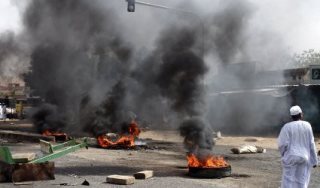Kerry fails to raise Sudan protests during meeting with Karti
October 1, 2013 (WASHINGTON) – US secretary of state John Kerry failed to raise the issue of Sudan’s bloody crackdown on anti-government protests during a private meeting in Washington on Friday with Sudanese foreign minister Ali Karti, despite the US government publicly condemning Sudan’s response.

At a press briefing following the meeting, journalists questioned why the topic had not been raised, saying its omission during the meeting seriously undermined the US government’s criticism of the violent crackdown on protesters.
However, Psaki defended the secretary’s decision not to raise the matter.
“As I mentioned, this is obviously an issue we have not been shy about speaking publicly about, the Secretary is clearly concerned about, as are many people in the government, and we’ve expressed that directly. This was not a lengthy meeting, and I wouldn’t take every topic that comes up or doesn’t come up as an indication of what’s important or not”, she told the media.
Psaki also reiterated the US government’s condemnation of the Sudanese government’s response to protests.
“Let me just take this opportunity to again strongly condemn the Government of Sudan’s brutal crackdown on protestors, including excessive use of force against civilians that has reportedly resulted in at least 50 deaths”, she said.
“Such a heavy-handed approach by Sudanese security forces is disproportionate, deeply concerning, and risks escalation of the unrest”, she added.
Daily demonstrations have been staged since the government announced its decision to cut fuel and cooking gas subsidies last Monday, which saw the doubling of pump prices overnight.
Scores of demonstrators have been shot dead by government forces, with authorities also accused of orchestrating internet blackouts and a media ban in an attempt to curb the growing wave of unrest sweeping the country.
Authorities say 33 people have died in the protests – the worst in the history of Sudanese president Omer Hassan al-Bashir’s two-decade rule. However, activists and human rights groups say at least 50 people have been gunned down, most of them in the Khartoum and Omdurman areas, although the true death toll remains difficult to determine and may be as high as 200.
In a statement last week, the US government urged both sides to show restraint, calling on the Sudanese government to respect the universal rights of its citizens, including the freedoms of speech, assembly, and peaceful protest.
The US special envoy to Sudan and South Sudan, Donald Booth, also attended the meeting.
Psaki said Kerry had called on Sudan to allow full humanitarian access to conflict-affected zones, protect civilians and to make further progress on a broad-based constitutional process to address the root causes of conflict.
She said while the secretary had welcomed recent improvements in Sudan’s engagement with South Sudan, he urged for the full implementation of the 27 September 2012 agreements, as well as a resolution on the issue of the final status of the oil-producing Abyei region, which is claimed by both countries.
BASHIR VISA ON AGENDA
Psaki confirmed that Karti had raised the matter of the Sudanese president’s visa application, which remains pending.
Bashir had been due to UN general assembly in New York
The matter has created further tensions between the two countries, with the Sudanese government last week summoning the US charge d’affaires in Khartoum to protest Washington’s apparent failure to grant Bashir visa
Karti, meanwhile, publicly criticised the US government on Friday in front of the general assembly for refusing Bashir’s application, accusing Washington of failing to fulfil its obligations as a UN host.
Psaki declined to say whether the application had been rejected or was still under consideration, saying visa records were confidential.
However, she confirmed that naturally the International Criminal Court’s (ICC) case against Bashir, who is wanted for alleged war crimes and crimes against humanity, was a part of the decision-making process.
“Clearly, there are a range of considerations that come into play given his background, which we’re all familiar with. But beyond that, I just don’t have an update on the status”, she said.
(ST)

